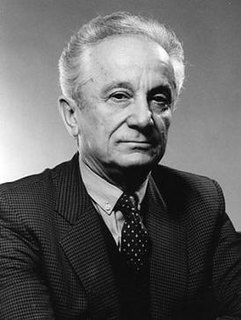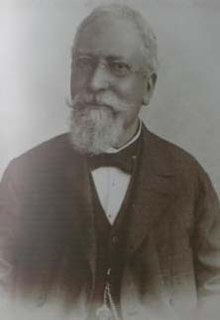
The Ustaša – Croatian Revolutionary Movement, commonly known as Ustaše, was a Croatian fascist, ultranationalist and terrorist organization, active, as one organization, between 1929 and 1945. Its members murdered hundreds of thousands of Serbs, Jews, and Roma as well as political dissidents in Yugoslavia during World War II. They were known for their particularly brutal and sadistic methods of execution, which often included torture and dismemberment.

Ante Pavelić was a Croatian politician and dictator who founded and headed the fascist ultranationalist organization known as the Ustaše in 1929 and governed the Independent State of Croatia, a fascist puppet state built out of Yugoslavia by the authorities of Nazi Germany and Fascist Italy, from 1941 to 1945. Pavelić and the Ustaše persecuted many racial minorities and political opponents in the NDH during the war, including Serbs, Jews, Romani, and anti-fascist Croats.

Jure Francetić was a Croatian Ustaša Commissioner for the Bosnia and Herzegovina regions of the Independent State of Croatia (NDH) during World War II, and commander of the 1st Ustaše Regiment of the Ustaše Militia, later known as the Black Legion. In both roles he was responsible for the massacre of Bosnian Serbs and Jews. A member of Ante Pavelić's inner circle, he was considered by many Ustaše as a possible successor to Pavelić as Poglavnik (leader) of the NDH. He died of wounds inflicted when he was captured by Partisans near Slunj in the Kordun region when his aircraft crash-landed there in late December 1942.

Vjekoslav Vrančić was a high-ranked Croatian Ustaše official who held different positions in the Independent State of Croatia during World War II in Yugoslavia. After the proclamation, he served as the Under Secretary of the Ustaše Foreign Affairs Ministry. In 1942, he was Pavelić's envoy to the Italian Second Army. In this role he entered into negotiations with Chetnik representatives Jevđeviċ, Grđiċ and Kraljeviċ. Then he served as Under Secretary in the Ustaše Interior Ministry, the "body directly responsible for concentration camps and repressive political apparatus". Vrančić was "decorated by Hitler in honor of his planning skills at the work of mass deportation".
The Democratic Alliance of Croats in Vojvodina is a minority political party of ethnic Croats in the Serbian province of Vojvodina, founded on July 15, 1990.

Za dom spremni! was a salute used during World War II by the Croatian Ustaše movement. It was the Ustaše equivalent of the fascist or Nazi salute "Sieg heil".
The Croatian National Resistance, also referred to as Otpor, was an Ustaša organization founded in 1955 in Spain. The HNO ran a terrorist organisation, Drina, which continued to be active well into the 1970s.
The Croatian National Alliance was a political party of ethnic Croats in autonomous province of Vojvodina, Serbia.
The Main Ustaša Headquarters was the ruling body of the Ustaša party in the Independent State of Croatia, convened under the poglavnik, Ante Pavelić.

Fadil Hadžić was a Croatian film director, screenwriter, playwright and journalist, mainly known for his comedy films and plays. He was of Bosnian origin, but mainly lived and worked in Croatia, and was well known throughout Yugoslavia.

Branimir "Branko" Jelić was a Croatian nationalist exile and doctor of medicine. Member of the fascist Ustaše organization.

Vinko Nikolić was a Croatian writer, poet and journalist, and a high-ranking official in the fascist Independent State of Croatia (NDH). After the downfall of NDH, he emigrated to Buenos Aires, Argentina, where he lived in exile until returning to Croatia, several years before his death.

Vid Morpurgo (1838–1911) was a Croatian industrialist, publisher, politician and member of a notable Split family Morpurgo.

Zdravka Bušić is a Croatian politician for the right-wing Croatian Democratic Union party.

Croatian History Museum is a museum of history located in the Vojković Palace on Antun Gustav Matoš Street in the historic Gornji Grad district of Zagreb, Croatia. The museum holdings consist of around 300,000 objects divided into 17 collections. In addition to a part of the Meštrović Pavilion, it also administers the Ivan Goran Kovačić Memorial Museum in Lukovdol.

Mihovil Pavlinović was a Croatian Roman Catholic priest, politician, and writer who led Croatian National Revival in the Kingdom of Dalmatia. He is known as a keen promoter of Croatian political thought in Dalmatia, one of the founders of the liberal People's Party and consistent advocate of unification of Kingdom of Dalmatia and Kingdom of Croatia-Slavonia.

"S tobom" is a song recorded by Croatian singer Franka Batelić. The song was released by Karpo Media on December 4, 2017. It was written by Branimir Mihaljević and Neno Ninčević and produced by Mihaljević.
Andrija Betlehem (1879—1943) was member of the "Doglavnik's Council" of the Main Ustaša Headquarters, the ruling body of the Ustaša party in the Independent State of Croatia.












